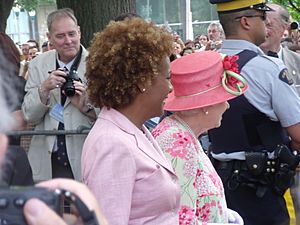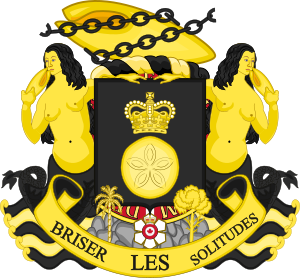Michaëlle Jean facts for kids
Quick facts for kids
Michaëlle Jean
|
|
|---|---|
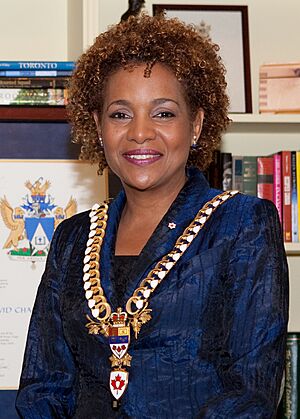
Jean c. 2010
|
|
| 27th Governor General of Canada | |
| In office September 27, 2005 – October 1, 2010 |
|
| Monarch | Elizabeth II |
| Prime Minister | Paul Martin Stephen Harper |
| Preceded by | Adrienne Clarkson |
| Succeeded by | David Johnston |
| 3rd Secretary-General of the Organisation internationale de la Francophonie | |
| In office January 5, 2015 – January 2, 2019 |
|
| Preceded by | Abdou Diouf |
| Succeeded by | Louise Mushikiwabo |
| Personal details | |
| Born | September 6, 1957 Port-au-Prince, Haiti |
| Spouse | Jean-Daniel Lafond |
| Education | Université de Montréal (BA, MA) |
| Signature | |
Michaëlle Jean (born September 6, 1957) is a Canadian journalist who became the 27th governor general of Canada. This important role means she was the representative of Queen Elizabeth II in Canada. She was the first person of Haitian background and the first Black person to hold this position.
Michaëlle Jean also served as the third Secretary-General of the Organisation internationale de la Francophonie from 2015 to 2019. This organization connects countries and regions that speak French. She was the first woman to lead this group.
Jean came to Canada as a refugee from Haiti in 1968. She grew up in Thetford Mines, Quebec. After earning two university degrees, she worked as a journalist and broadcaster for Radio-Canada and the Canadian Broadcasting Corporation (CBC). She also did charity work, especially helping victims of domestic violence.
In 2005, Queen Elizabeth II appointed her as Governor General. This was suggested by Prime Minister Paul Martin. She served until 2010, when David Johnston took over. Early in her time, some people wondered about her loyalty to Canada because of past comments and her dual citizenship. However, Jean stated her strong commitment to Canada and gave up her French citizenship. She became a respected Governor General, known for supporting the Canadian Forces, Indigenous Canadians, and the arts. In 2010, she became a special envoy for Haiti for UNESCO.
Michaëlle Jean became a member of the Queen's Privy Council for Canada on September 26, 2012.
Contents
Early Life and Education
Michaëlle Jean's family is from Haiti. She was born in Port-au-Prince. She spent her winters there and summers in Jacmel, her mother's hometown. Her parents taught her at home because they did not want her to promise loyalty to the Haitian president at the time.
Her family left Haiti to escape the government. Her father went to Canada in 1967, and she arrived with her mother and sister the next year. They settled in Thetford Mines, Quebec. Later, she moved with her mother and sister to Montreal.
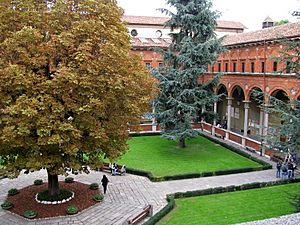
Jean earned a degree in Italian and Spanish languages from the University of Montreal. From 1984 to 1986, she taught Italian Studies there while working on her master's degree. She also studied languages and literature in Italy. Besides French and English, Jean speaks Spanish, Italian, and Haitian Creole. She can also read Portuguese.
While studying, Jean worked to help women and children. She helped create a network of shelters across Canada. She also helped immigrants and wrote about the experiences of immigrant women. She married Jean-Daniel Lafond, a Canadian filmmaker. They adopted a daughter named Marie-Éden from Haiti.
Journalism and Broadcasting Career
In 1988, Jean became a reporter and broadcaster for Radio-Canada. She hosted news shows like Actuel and Le Point. She was the first person of Caribbean background to appear on French television news in Canada. In 1995, she moved to RDI, Radio-Canada's news channel. She anchored many programs there.
Later, she hosted The Passionate Eye and Rough Cuts for CBC Newsworld. These shows featured Canadian and international documentary films. By 2004, Jean had her own show called Michaëlle. She also continued to anchor news programs.
Jean also made films with her husband. One award-winning film was Haïti dans tous nos rêves ("Haiti in All Our Dreams"). In this film, she met her uncle, a poet who had left Haiti. She produced and hosted news and documentary programs for both English and French CBC television.
Governor General of Canada
Michaëlle Jean was the first Governor General of Canada with Caribbean roots. She was the third woman to hold the role. She was also the fourth youngest and the fourth former journalist. She was the second Governor General, after Adrienne Clarkson, to not have a political or military background. She was also the first representative of Queen Elizabeth II to be born during the Queen's reign.
Becoming Governor General
On August 4, 2005, it was announced that Queen Elizabeth II had approved Prime Minister Paul Martin's choice of Jean. Martin said Jean was a "woman of talent and achievement." He called her personal story "extraordinary." He believed she would represent all of Canada well.
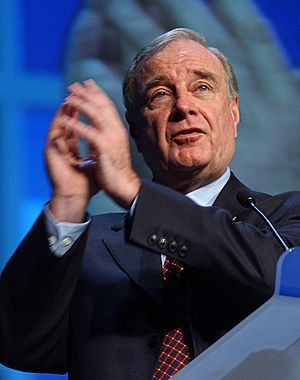
Most people reacted positively to the news. Jean's predecessor, Adrienne Clarkson, praised the choice. Jean herself encouraged Canadians to get involved in their communities. She wanted to connect with all Canadians, especially youth and those facing challenges.
However, some questions arose about her past. There were reports about her and her husband's views on Quebec independence. Jean quickly responded with a public statement. She said, "both my husband and I are proud to be Canadian." She added that they had "the greatest respect for the institutions of our country." She clarified that her past comments were about Haiti, not Quebec. Prime Minister Martin also confirmed his trust in her.
On September 6, 2005, the Queen met with Jean and her family at Balmoral Castle. This was a special meeting because Jean brought her young daughter. Jean later said it was "probably the best birthday of my life."
Another issue came up about her dual citizenship with France. As Governor General, she would represent Canada's head of state and have a military role. French law at the time had rules about citizens holding government positions in other countries. To avoid any conflict, Jean announced on September 25 that she had given up her French citizenship.
In Office
Jean's swearing-in ceremony took place on September 27, 2005. In her speech, she spoke about "breaking down solitudes." She called for protecting the environment and culture. She also wanted to end the struggles faced by young people. Her motto as Governor General was BRISER LES SOLITUDES, meaning "breaking down isolation."
One of her first actions was to start an online chat with Canadians. This was part of a project called "Citizen Voices: Breaking Down Solitudes." It aimed to connect Canadians from all backgrounds.
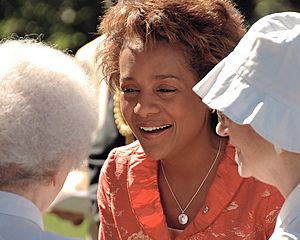
During her first two years, Jean visited all of Canada's provinces and territories. She met with many people and focused on helping women who had experienced violence. She also met with Indigenous women leaders. People welcomed her warmly wherever she went.
Military Duties and International Visits
Jean and her family made their first international trip in February 2006. They went to Italy for the Winter Olympics and met the Pope. Three months later, Jean visited Haiti for the first time as the Queen's representative. She was welcomed with excitement in her hometown of Jacmel.
Later in 2006, Jean visited five African countries. She encouraged women's rights during these trips. She also shared her experiences on her Citizen Voices website. In Mali, she was greeted by thousands of people.
Jean took her role as acting commander-in-chief seriously. She visited Canadian soldiers in Afghanistan in March 2007. She timed her visit for International Women's Day. She met with Afghan women, Canadian soldiers, and aid workers.
Public Role and Parliament
Jean carried out many official duties. She dedicated the new Michael Lee-Chin Crystal at the Royal Ontario Museum. She also made a state visit to Brazil.
In late 2008, Jean had to return to Canada from a trip to deal with a political disagreement. Three opposition parties in parliament wanted to form a new government. After careful thought, Jean followed the Prime Minister's advice to pause parliament until January 2009. This helped resolve the situation and avoid a new election so soon after the last one.
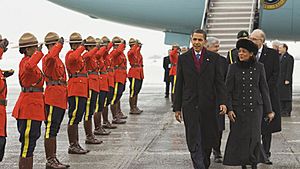
In early 2009, Jean visited Nunavut. She participated in a traditional Inuit seal feast. She ate a piece of raw seal heart, which is a traditional act of respect. This drew attention because of a recent ban on Canadian seal products in Europe. Jean's action was seen as supporting Inuit culture.
Jean made more state visits in 2009, including to Norway, Croatia, Greece, and Mexico. She also visited Canadian troops in Afghanistan again. She wore military uniforms for some events, bringing back a tradition. In June 2010, she reviewed the Canadian navy fleet to mark its 100th anniversary.
Jean received praise for her actions after the 2010 Haiti earthquake in January 2010. She lost a friend in the earthquake. She made a tearful speech, urging strength for Haitians. She later visited Haiti to see the damage and Canadian aid efforts.
End of Her Term
Jean announced in early 2010 that she would finish her five-year term. Many people supported her and wanted her to stay longer. Polls showed she had a high approval rating.
On May 10, 2010, Princess Margriet of the Netherlands presented Jean with a new tulip named the Michaëlle Jean tulip. This continued a tradition of Dutch royalty giving tulips to Canada.
People looked back at Jean's time as Governor General with admiration. She used her role to promote freedom, human rights, and youth. She brought attention to social problems in Canada's North. She was praised for her dedication to the arts, Indigenous Canadians, and the Armed Forces. She was also noted for her ability to connect with people and her frequent displays of emotion.
Life After Being Governor General
After leaving office, the Canadian government created the Michaëlle Jean Foundation. This foundation focuses on promoting education, culture, and creativity among young people in Canada.
On November 8, 2010, Jean was appointed as a special envoy to Haiti for UNESCO. Her goal was to fight poverty and illiteracy and raise money internationally. She served in this role for four years.
In 2011, Jean called for big changes to Haiti's education system. She believed it was key to the country's future. She was also appointed as Chancellor of the University of Ottawa in 2012, a role she held until 2015.
In 2023, Jean was a main speaker at Canada's Supporting Women in Film Trades (SWIFT) Conference. She was chosen because she had achieved great things in fields like politics, journalism, and filmmaking, which were often dominated by men.
Secretary-General of La Francophonie
In 2011, Abdou Diouf, the Secretary-General of La Francophonie, appointed Jean as the Grand Témoin de la Francophonie for the 2012 Summer Olympics in London. Her job was to promote the French language during the Olympic Games.
In 2014, Canada and other governments supported Jean's bid to become the next Secretary-General of La Francophonie. On November 30, 2014, she was chosen for the position.
Her four-year term began on January 5, 2015. During this time, she promoted fair elections, education, and the rights of women and girls.
Jean wanted to serve a second term, but other countries supported a different candidate, Louise Mushikiwabo. Jean's term ended on January 2, 2019.
Chancellor of St. Paul's University College
In late October 2020, Jean was named Chancellor of St. Paul's University College. This school is connected to the University of Waterloo. It offers programs in Indigenous Studies, International Development, Canadian Studies, and Human Rights.
Head of the Fédération haïtienne de football
From 2021 to 2022, Jean was given the task of helping to improve Haitian soccer. She and her team were to organize the election of a new leadership committee for the Haitian Football Federation.
Honours and Awards
Michaëlle Jean has received many honours and awards for her work and service.
Important Appointments
- From 2005 to 2010, she was the Chancellor and Principal Companion of the Order of Canada. This is one of Canada's highest honours.
- She was also the Chancellor and Commander of the Order of Military Merit (Canada) and the Order of Merit of the Police Forces.
- She was a Dame of Justice of the Venerable Order of Saint John.
- From 2005 to 2010, she was the Chief Scout of Canada.
- In 2012, she became a member of the Queen's Privy Council for Canada.
Medals
- She received the Canadian Forces' Decoration in 2005.
- In 2005, she received the Commemorative Medal for the Centennial of Saskatchewan.
- In 2012, she received the Queen Elizabeth II Diamond Jubilee Medal.
Awards
Jean has won many awards for her journalism and human rights work. These include:
- The Human Rights League of Canada Media Award in 1989.
- The Amnesty International Canada Journalism Award in 1995.
- The City of Montreal Citizen of Honour in 1997.
- Several awards from the Canadian Broadcasting Corporation for her television work.
- The Top 25 Canadian Immigrant Awards in 2009.
- The Ottawa Key to the City in 2022.
Foreign Honours
- In 2010, she received the United Nations Development Fund for Women Canada Award.
- In 2011, she received the Grand Cross of the National Order of the Legion of Honour from France.
Honorary Military Appointments
As Governor General, she held honorary positions in Canadian military regiments:
- Colonel of the Governor General's Horse Guards (2005–2010)
- Colonel of the Governor General's Foot Guards (2005–2010)
- Colonel of the Canadian Grenadier Guards (2005–2010)
Honorary Degrees
Michaëlle Jean has received many honorary degrees from universities around the world, recognizing her achievements. These include degrees from:
- University of Ottawa (2006)
- McGill University (2006)
- University of Manitoba (2007)
- University of Alberta (2008)
- Université de Montréal (2010)
- University of Guelph (2011)
- University of Calgary (2011)
- Carleton University (2012)
- Dalhousie University (2019)
Places and Things Named After Her
- Michaëlle Jean Park in Winnipeg
- École Élémentaire Michaëlle Jean in Binbrook
- Michaëlle Jean Public School in Barrhaven
- Michaëlle Jean Public School in Richmond Hill
- The Michaëlle Jean tulip
Coat of Arms
Just before she became Governor General, Michaëlle Jean was given her own coat of arms. It shows symbols that represent her Haitian background and her role in Canada.
- The shield has a sand dollar, which was a special good luck charm for her. It also has the Royal Crown, showing her authority as the Queen's representative.
- The shell with a broken chain refers to a famous sculpture in Haiti. This sculpture shows an escaped slave blowing a shell to call others to freedom. This symbol represents her ancestors' escape from slavery.
- Two Simbis, which are Haitian water spirits, support the shield. They are known for calming rough seas and giving wisdom.
- The symbols stand on a rocky ground with a palm tree (a Haitian symbol of peace) and a pine tree (representing Canada's natural wealth).
- Her motto is BRISER LES SOLITUDES, which means "breaking down isolation."
See also
 In Spanish: Michaëlle Jean para niños
In Spanish: Michaëlle Jean para niños
- Haitian Canadian
- Immigration to Canada
- List of elected and appointed female heads of state
 | Jewel Prestage |
 | Ella Baker |
 | Fannie Lou Hamer |


